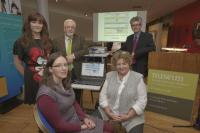Community Archive Network launched at the National Museum of Ireland–Country Life
Published in 20th-century / Contemporary History, Issue 1(Jan/Feb 2012), News, Volume 20
At the launch of the Community Archive Network (clockwise from left): project co-ordinator Lorna Elms, Education and Outreach Department, NMI–Country Life; David Collins, Oughterard Culture and Heritage Group; Tommy Graham, History Ireland; Averil Staunton, Ballinrobe Archaeological, Cultural and Heritage Society; Mary O’Malley, Louisburgh/Killeen Heritage Group. (National Museum of Ireland)
On Friday 11 November
HI editor Tommy Graham officially launched a network of four local history websites developed by communities in the west of Ireland. The websites are the result of an education and outreach initiative by the National Museum of Ireland–Country Life, whereby each of the participating groups has collected, digitally preserved and made accessible their local histories on-line. Created by Community Sites in the UK, the websites are specifically designed not only to share information but also to encourage active participation from people across the world with a link to the locality. Lorna Elms of the Education Department explains:
‘The aim of this project was to engage communities in an exciting and innovative way with the National Museum and its collections. We have successfully raised the profile of the Museum in these localities, bringing new visitors to Turlough Park and adding to our collective knowledge of local events, people, traditions and customs.’
The groups from Oughterard, Co. Galway, Ballinrobe and Louisburgh/Killeen, Co. Mayo, have gathered their communities’ family photographs, memories and other ephemera and, with the help of training and mentoring, have digitised and uploaded these unique collections to a website that they have developed themselves. These archives are invaluable not only because they save for posterity the photographs and documentation but also because they tell the human stories behind them. A key feature of a digital community archive is that photographs and memorabilia can be scanned and then returned to the owner. This not only reduces the need for an appropriate space that would be required for a physical archive but also means that important information can be recorded without the need for a permanent donation. Associated cataloguing software is being used to record the factual information about each item to a professional standard, providing an on-line, searchable facility for researchers and people with links to the area. Visit the network’s first on-line catalogue at www.catalogue.oughterard heritage.org/.The role of the National Museum has been one of coordination and support, providing a space to work and meet, access to equipment and the expertise of Museum staff with training in a number of relevant areas. The work has been carried out entirely by the groups on behalf of their communities. The groups have joined together to form a network of sites so that they can share knowledge, skills and resources and cross-promote their websites. According to Lorna Elms, who coordinates the project on behalf of the Museum:
‘A project like this takes a huge amount of time, effort and dedication but the results have made the hard work worthwhile. Not only are these communities uncovering and writing their own histories, preserving previously unrecorded information, they are also raising awareness and appreciation of their heritage, recording the irreplaceable knowledge of their older generations and promoting to a worldwide audience the desirability of their locality as a tourist destination.’
The contributory nature of these websites is proving attractive not only to the immediate communities but also to their diaspora. Invaluable new information is being submitted to the sites, with the result that the archives are expanding. Google analytics show visitors to the sites from across the globe, from Australia to Canada, the USA to New Zealand, and even an island in the Pacific! On launching the network Tommy Graham said, ‘We at History Ireland have always been of the view that history and heritage are far too important to be left to the academics’, and noted that similarly these communities are adopting a grass-roots approach. He commended the National Museum on the project and the quality of the website design.Anyone with links to Oughterard, Ballinrobe or Louisburgh/Killeen can view the archives or contribute information by visiting www.oughterardheritage.org, www.historicalballinrobe.com or www.louisburgh-killeenheritage.org.www.ouririshheritage.org has been developed by the Education Department as the home of the Irish Community Archive Network. This website tells the story of the project and promotes articles from member sites, encouraging new visitors to the archives. It also provides information and advice for groups that may be interested in starting their own community archive and, potentially, joining the network.Individuals and groups without the resources to create their own website now have an opportunity to share information on what makes their area special, as Our Irish Heritage aims to develop an on-line archive that reflects the history and heritage of the wider community of the island of Ireland. An ‘Our Irish Events’ page provides a facility for the free promotion of heritage and cultural events, large or small, via a simple on-line form. All of the groups will continue to expand their archives and in 2012 aim to engage young people with their local heritage, using digital media and smart phone technology. All of the groups would welcome new volunteers and anyone who is interested can contact the groups via the websites. HI
Enquiries: Lorna Elms, +353 (0)94 9031751, educationtph@museum.ie.
















